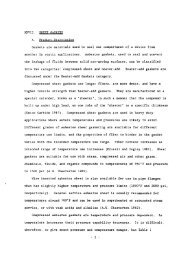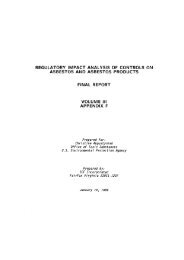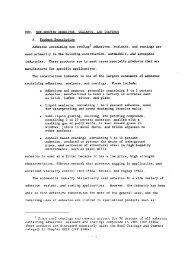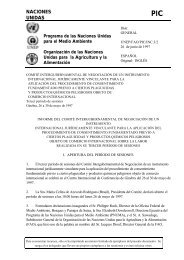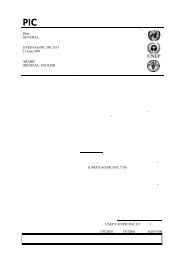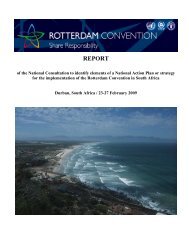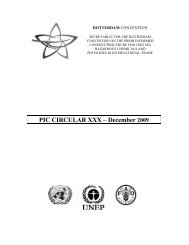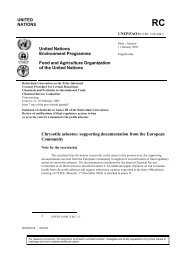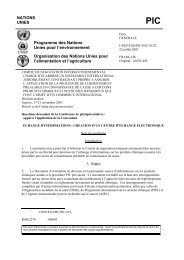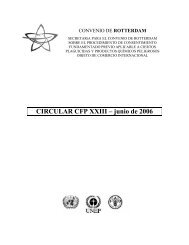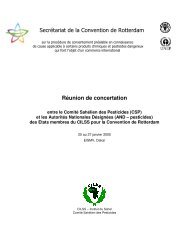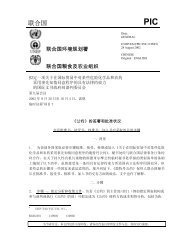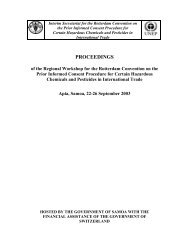INC9 REPORT.pdf - Rotterdam Convention
INC9 REPORT.pdf - Rotterdam Convention
INC9 REPORT.pdf - Rotterdam Convention
Create successful ePaper yourself
Turn your PDF publications into a flip-book with our unique Google optimized e-Paper software.
UNEP/FAO/PIC/INC.9/21<br />
130. The Convenor of the group of Friends of the Chair, the representative of Australia, reported to the<br />
Committee on the deliberations of the Group on the three outstanding issues and introduced a conference<br />
room paper containing its proposals for recommendations to the Conference of the Parties.<br />
131. On the basis of the proposals submitted by the Friends of the Chair, the Committee adopted<br />
recommendations to the first meeting of the Conference of the Parties.<br />
132. The recommendations are contained in annex III to the present report.<br />
VI. ISSUES ARISING OUT OF THE CONFERENCE OF PLENIPOTENTIARIES<br />
A. Support for implementation<br />
133. The representative of the secretariat drew the attention of the Committee to the document on the<br />
subject (see annex I). He said that, while direct bilateral assistance between countries, as well as through the<br />
secretariat, had been available for such things as the holding of regional and subregional workshops, requests<br />
for follow-up actions were often not implemented owing to the lack of a mechanism for technical assistance.<br />
He added that member organizations of the IOMC were undertaking projects in support of capacity-building<br />
that could have benefits for country needs under the <strong>Convention</strong> and that activities under the Stockholm<br />
<strong>Convention</strong> could be of relevance to the <strong>Rotterdam</strong> <strong>Convention</strong>. Joint workshops were already being held<br />
for activities related to the Basel <strong>Convention</strong>, the Montreal Protocol, the Stockholm <strong>Convention</strong> and the<br />
<strong>Rotterdam</strong> <strong>Convention</strong>.<br />
134. He pointed to the recent GEF Council proposals to include a new focal area on persistent organic<br />
pollutants and to text that could make the incremental costs concerning chemicals management related to<br />
GEF focal areas eligible for funding. Those proposals would be decided at the next GEF Assembly, in<br />
October 2002. A positive decision could offer opportunities for limited support of <strong>Rotterdam</strong> <strong>Convention</strong><br />
activities in countries.<br />
135. Representatives noted that promoting voluntary contributions to the Trust Fund would assist in<br />
carrying out activities to implement the <strong>Convention</strong>, in particular through workshops. Parties experiencing<br />
difficulties in implementing the <strong>Convention</strong> were advised to inform the secretariat, which could also inform<br />
potential donors of such needs. Several representatives said that it was important to coordinate action on the<br />
various chemicals-related conventions at the global level and at the local level.<br />
136. Concerning the GEF, one representative raised the question of whether GEF funding was available<br />
specifically for the <strong>Rotterdam</strong> <strong>Convention</strong>. Another representative noted that there would be great demand<br />
for GEF funds, and that such GEF funds would have to be allocated solely based on the GEF focal areas, not<br />
on the basis of incremental benefits.<br />
137. Many representatives expressed appreciation for the workshops which had been held and noted that<br />
countries had elaborated their needs for support in implementing the <strong>Convention</strong> during those workshops.<br />
Representatives informed the Committee about activities related to technical assistance, training and<br />
information exchange. The secretariat was encouraged to work closely with secretariats of other multilateral<br />
environment agreements to avoid duplication, maintain consistency and ensure efficient use of resources.<br />
One information workshop on technical implementation aspects common to chemicals conventions had<br />
looked at the overlap of such implementation and recommended round-table discussions of concerned bodies<br />
at the local level. It was noted that the Information Exchange Network on Capacity Building for the Sound<br />
Management of Chemicals (INFOCAP) could successfully support technical assistance in that area.<br />
138. Several representatives drew attention to the need to link requests to sustainable development<br />
priorities and to poverty reduction. It was noted that it was important for developing countries and countries<br />
with economies in transition to put requests for assistance in their national development plans.<br />
18



